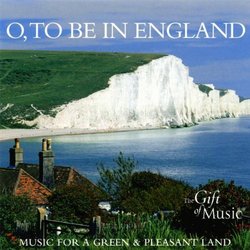| All Artists: The New Zealand Symphony Orchestra;The London Philharmonic Orchestra;The Halle Orchestra;The English Northern Philharmonia;& others Title: O, to be in England Members Wishing: 0 Total Copies: 0 Label: The Gift of Music Original Release Date: 1/1/2009 Re-Release Date: 2/1/2009 Genre: Classical Style: Symphonies Number of Discs: 1 SwapaCD Credits: 1 UPC: 658592121322 |
Search - The New Zealand Symphony Orchestra;The London Philharmonic Orchestra;The Halle Orchestra;The English Northern Philharmonia;& others :: O, to be in England
 | The New Zealand Symphony Orchestra;The London Philharmonic Orchestra;The Halle Orchestra;The English Northern Philharmonia;& others O, to be in England Genre: Classical
O, to be in England — Music for a green and pleasant land A fine collection of moving and wistful orchestral works which celebrate the English landscape and its natural beauty. English composers have always excelled at past... more » |
Larger Image |
CD Details
Synopsis
Product Description
O, to be in England
Music for a green and pleasant land A fine collection of moving and wistful orchestral works which celebrate the English landscape and its natural beauty. English composers have always excelled at pastoral music with a hint of nostalgia: from 'the lark ascending' to the strains of 'Greensleeves' this evocative selection features some of this pleasant land's finest music. English music-making and composition has long been associated with a reaction to the beautiful and varied rural landscapes of this historic country. Because it is often tinged with nostalgia and a forlorn romanticism, English music has often been undervalued, not least by the British establishment itself. Sir Edward Elgar was keen on being a part of that establishment , and composed much ceremonial and formal music for royal events and state occasions. He resisted the pastoral idiom at all stages of his life, although the 'Chanson de matin' comes pretty close. Vaughan Williams and Butterworth amongst others, including Arnold Bax, are often thought of as part of an English pastoral tradition stretching back centuries. All these composers were fascinated by English folk music and both used folk songs as the melodic basis of many of their works. But let's not forget that Vaughan Williams studied in Paris with Ravel and Butterworth in London with Sir Hubert Parry: neither of these great men were particularly enamoured of lightweight composing and both were steeped in a fundamentally European tradition of the highest order. Vaughan Williams' and Butterworth's incredibly fine understanding of orchestral writing reflects this. Bax's tone poems fit into the pastoral mode, too, and we enjoy them particularly for this today: but they are also rigorously constructed works by a fine symphonist who was clearly aware of the techniques of Brahms and Bruckner. Bax was fascinated by Celtic legend and English history. This is reflected in the subject matter of Tintagel with its association with King Arthur: 'the castle-crowned cliff of Tintagel, andthe long distances of the Atlantic, as seen from the cliffs of Cornwall on a sunny but not windless summer day.' Gustav Holst loved the English countryside, having been brought up in Gloucestershire on the edge of the Cotswolds. His most famous work is 'The Planets', an orchestral tour de force of the highest order. The 'Somerset Rhapsody' features several folk tunes wrapped up in a sophisticated orchestral texture. It was written at the suggestion of Cecil Sharp, the great collector of English folk music who was also a friend of Vaughan Williams and Butterworth.
Music for a green and pleasant land A fine collection of moving and wistful orchestral works which celebrate the English landscape and its natural beauty. English composers have always excelled at pastoral music with a hint of nostalgia: from 'the lark ascending' to the strains of 'Greensleeves' this evocative selection features some of this pleasant land's finest music. English music-making and composition has long been associated with a reaction to the beautiful and varied rural landscapes of this historic country. Because it is often tinged with nostalgia and a forlorn romanticism, English music has often been undervalued, not least by the British establishment itself. Sir Edward Elgar was keen on being a part of that establishment , and composed much ceremonial and formal music for royal events and state occasions. He resisted the pastoral idiom at all stages of his life, although the 'Chanson de matin' comes pretty close. Vaughan Williams and Butterworth amongst others, including Arnold Bax, are often thought of as part of an English pastoral tradition stretching back centuries. All these composers were fascinated by English folk music and both used folk songs as the melodic basis of many of their works. But let's not forget that Vaughan Williams studied in Paris with Ravel and Butterworth in London with Sir Hubert Parry: neither of these great men were particularly enamoured of lightweight composing and both were steeped in a fundamentally European tradition of the highest order. Vaughan Williams' and Butterworth's incredibly fine understanding of orchestral writing reflects this. Bax's tone poems fit into the pastoral mode, too, and we enjoy them particularly for this today: but they are also rigorously constructed works by a fine symphonist who was clearly aware of the techniques of Brahms and Bruckner. Bax was fascinated by Celtic legend and English history. This is reflected in the subject matter of Tintagel with its association with King Arthur: 'the castle-crowned cliff of Tintagel, andthe long distances of the Atlantic, as seen from the cliffs of Cornwall on a sunny but not windless summer day.' Gustav Holst loved the English countryside, having been brought up in Gloucestershire on the edge of the Cotswolds. His most famous work is 'The Planets', an orchestral tour de force of the highest order. The 'Somerset Rhapsody' features several folk tunes wrapped up in a sophisticated orchestral texture. It was written at the suggestion of Cecil Sharp, the great collector of English folk music who was also a friend of Vaughan Williams and Butterworth.
Similar CDs
| Ana Popovic Blind For Love Genres: Blues, Pop, Rock Label: Eclecto Groove Records | |
| Fabri Fibra Turbe Giovanili Genres: International Music, Pop Label: Universal Italy | |
| Confederate Railroad Live: Back to the Barrooms Genres: Country, Pop Label: E1 Music | |

 Track Listings (7) - Disc #1
Track Listings (7) - Disc #1

